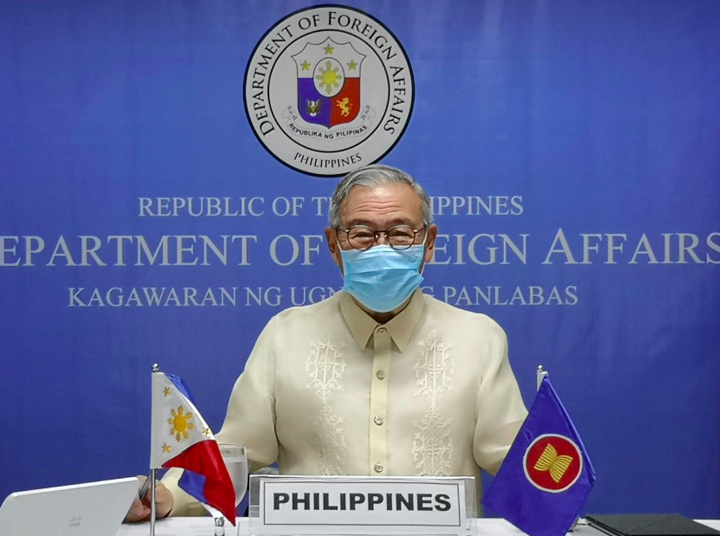
The Arbitral Award is the “north star” that would hopefully keep us on course in the present and provide the right direction in the future, Foreign Affairs Secretary Teodoro Locsin Jr., on the 5th anniversary of the Permanent Court of Arbitration’s (PCA) historic award granted to the Philippines in 2016, said.
“For as long as nations abide by the rule of law and not of military might, the award is the north star that will keep us on course in the present, and that will point us back to the right direction in the future should we, in a moment of weakness or inaction, lose our way,” the country’s top diplomat said.
“The award is final. We firmly reject attempts to undermine it; may, even erase it from law, history and our collective memories,” Locsin added.
He said the award conclusively settled the status of historic rights and maritime entitlements in the South China Sea (SCS) “and declared as without legal effect claims that exceed geographic and substantive limits of maritime entitlements under UNCLOS,” referring to China’s nine-dash line, which the PCA invalidated and deemed illegal.
“It dashed among others a nine-dash line; and any expectation that possession is 9/10ths of the law. Because the mere fact of possession produces no legal effect, such as a territorial sea of any extent,” said the Harvard-trained lawyer.
Locsin stressed that the Arbitral Award “became and continues to be a milestone in the corpus of international law and is available to other countries with the same problematic maritime features as ours.”
Aside from the Philippines and China, other claimants to the strategic waters include Vietnam, Malaysia, Brunei and Taiwan.
Locsin said in seeking a peaceful way to find a solution to the ticklish issue, the award “puts one issue out of the way of conflict; because there is nothing there taken by force that results in any gain in law.”
“In summary, the award gives littoral states guideposts on how much waters their features—be they islands or rocks—can generate, where their fishermen can fish, where they can exercise law enforcement patrols, where they can send their ships without permission from the nearest state, without creating a cause of action or a casus belli between them,” he said.
This statement, Locsin added, gives littoral fishermen the assurance that henceforth, they would able to engage in exploiting the marine resources of the area, for generations their traditional fishing grounds, without fear of outside intervention.
The former presidential spokesman noted that the award benefits the world across the board. “We do not see it as directed at any other country, near or far,” he said.
“We see it as it should be seen: as favoring all which are similarly situated by clarifying definitively a legal situation beyond the reach of arms to change,” Locsin said.
Locsin echoed President Duterte’s pronouncement at the UN General Assembly that the award “is now part of international law, beyond compromise and beyond the reach of passing governments to dilute, diminish or abandon.”
He added that the Philippines is proud to have contributed to the international rules-based order, to the affirmation of UNCLOS, and the strengthening of the legal order over the seas.
At the time of the conflict with the Asian giant in 2012, the Philippines was the lone country that brought the case before the International Tribunal in The Hague—a David against a Goliath scenario—“amid hosts of indifferent spectators.”
But despite the absence of friend or ally, Locsin said, “right prevailed.”
“For the Arbitral Award was given to a set of maritime circumstances that would be as true in our waters as in others.” It is the legacy that a-not-rich country leaves to mankind along with a greater prospect of peace and cooperation,” he stated.
Locsin said “might does not make right. But then neither does right make might. Right alone produces almost nothing: nothing but conviction. And that we have.”
Presently, the three-time Makati congressman noted that “the rest of the world is coming around to our point of view, which means as little to us now as it did then when we fought alone.”
Locsin paid tribute to President Duterte’s being courteous at the United Nations, when the latter said: “We welcome the increasing number of states that have come in support of the award and what it stands for—the triumph of reason over rashness, of law over disorder, of amity over ambition. This is the majesty of law.”
The Philippines and China, despite some hiccups along the way, are on good terms, being able to settle their differences amicably.
The Chinese proposed to leave the issue to future generations, “who may be more intelligent than we are in finding a solution.”
Both countries have drafted a joint cooperation agreement to explore and exploit prospective oil and gas resources in the West Philippine Sea, with China agreeing to the 60-40 sharing scheme embodied by the Philippine Constitution.
Image courtesy of DFA-ASEAN
